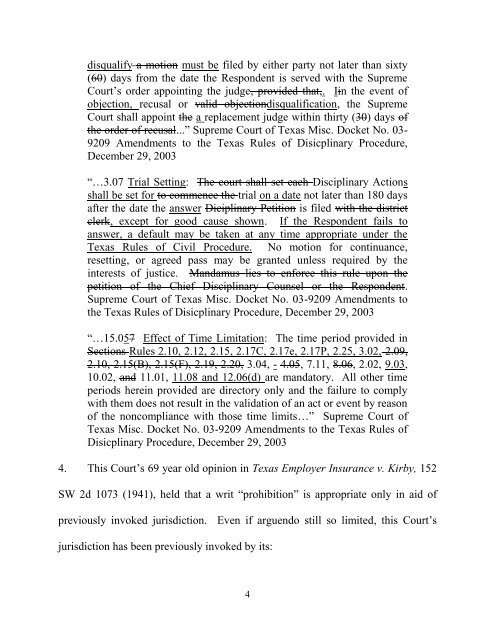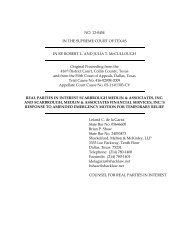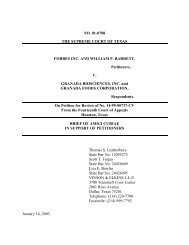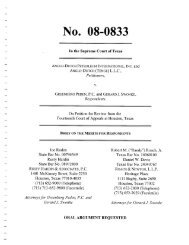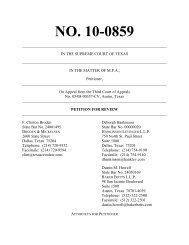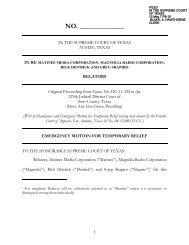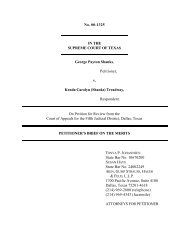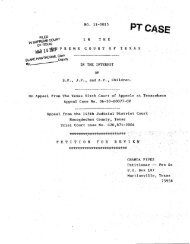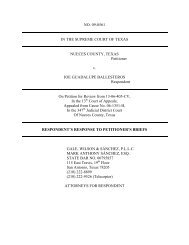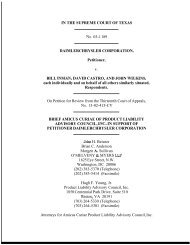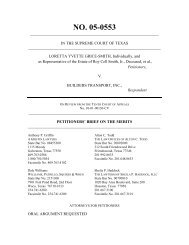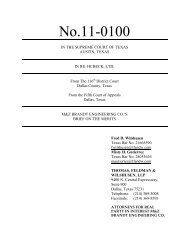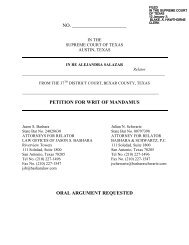Petition for Writ of Prohibition - Filed - Supreme Court of Texas
Petition for Writ of Prohibition - Filed - Supreme Court of Texas
Petition for Writ of Prohibition - Filed - Supreme Court of Texas
Create successful ePaper yourself
Turn your PDF publications into a flip-book with our unique Google optimized e-Paper software.
disqualify a motion must be filed by either party not later than sixty<br />
(60) days from the date the Respondent is served with the <strong>Supreme</strong><br />
<strong>Court</strong>’s order appointing the judge, provided that,. Iin the event <strong>of</strong><br />
objection, recusal or valid objectiondisqualification, the <strong>Supreme</strong><br />
<strong>Court</strong> shall appoint the a replacement judge within thirty (30) days <strong>of</strong><br />
the order <strong>of</strong> recusal...” <strong>Supreme</strong> <strong>Court</strong> <strong>of</strong> <strong>Texas</strong> Misc. Docket No. 03-<br />
9209 Amendments to the <strong>Texas</strong> Rules <strong>of</strong> Disicplinary Procedure,<br />
December 29, 2003<br />
“…3.07 Trial Setting: The court shall set each Disciplinary Actions<br />
shall be set <strong>for</strong> to commence the trial on a date not later than 180 days<br />
after the date the answer Diciplinary <strong>Petition</strong> is filed with the district<br />
clerk, except <strong>for</strong> good cause shown. If the Respondent fails to<br />
answer, a default may be taken at any time appropriate under the<br />
<strong>Texas</strong> Rules <strong>of</strong> Civil Procedure. No motion <strong>for</strong> continuance,<br />
resetting, or agreed pass may be granted unless required by the<br />
interests <strong>of</strong> justice. Mandamus lies to en<strong>for</strong>ce this rule upon the<br />
petition <strong>of</strong> the Chief Disciplinary Counsel or the Respondent.<br />
<strong>Supreme</strong> <strong>Court</strong> <strong>of</strong> <strong>Texas</strong> Misc. Docket No. 03-9209 Amendments to<br />
the <strong>Texas</strong> Rules <strong>of</strong> Disicplinary Procedure, December 29, 2003<br />
“…15.057 Effect <strong>of</strong> Time Limitation: The time period provided in<br />
Sections Rules 2.10, 2.12, 2.15, 2.17C, 2.17e, 2.17P, 2.25, 3.02, 2.09,<br />
2.10, 2.15(B), 2.15(F), 2.19, 2.20, 3.04, - 4.05, 7.11, 8.06, 2.02, 9.03,<br />
10.02, and 11.01, 11.08 and 12.06(d) are mandatory. All other time<br />
periods herein provided are directory only and the failure to comply<br />
with them does not result in the validation <strong>of</strong> an act or event by reason<br />
<strong>of</strong> the noncompliance with those time limits…” <strong>Supreme</strong> <strong>Court</strong> <strong>of</strong><br />
<strong>Texas</strong> Misc. Docket No. 03-9209 Amendments to the <strong>Texas</strong> Rules <strong>of</strong><br />
Disicplinary Procedure, December 29, 2003<br />
4. This <strong>Court</strong>’s 69 year old opinion in <strong>Texas</strong> Employer Insurance v. Kirby, 152<br />
SW 2d 1073 (1941), held that a writ “prohibition” is appropriate only in aid <strong>of</strong><br />
previously invoked jurisdiction. Even if arguendo still so limited, this <strong>Court</strong>’s<br />
jurisdiction has been previously invoked by its:<br />
4


